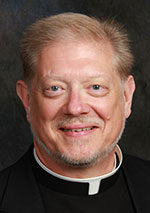That All May Be One / Fr. Rick Ginther
Archbishop Thompson continues work of unity among faiths
 July 28 marks the fifth anniversary of Archbishop Charles C. Thompson’s installation as the seventh archbishop of the Archdiocese of Indianapolis.
July 28 marks the fifth anniversary of Archbishop Charles C. Thompson’s installation as the seventh archbishop of the Archdiocese of Indianapolis.
During the liturgical celebration of a bishop’s installation, civic and religious leaders come forward to greet him.
In 2017, Archbishop Thompson was greeted by several local Christian denominational leaders (“judicatories”) and leaders of other religions. These first encounters have led to relationship building.
Following the examples of Archbishop Daniel M. Buechlein and then-Archbishop Joseph W. Tobin, Archbishop Thompson has embraced the monthly gathering of Christian judicatories in Indianapolis, which has a long history.
It was begun by the former Church Federation of Greater Indianapolis. The meetings take place at the Interchurch Center on West 42nd Street. That center, conceived during the ecumenical fervor of the 1960s, still houses many Christian denominational headquarters.
As he approached his anniversary, I asked Archbishop Thompson for his reflections on the ecumenical and interreligious role of a bishop.
Encountering the various judicatories and other faith leaders at his installation, he said, “reminded me that a bishop has to be an ecumenical leader, reaching out beyond his own denomination. The body of Christ is more than Roman Catholic. We are to strive for that unity that was lost.”
He also noted that the archbishop “is to be present to non-Christians as well.” He added, “I come from a diocese [Archdiocese of Louisville] with strong interreligious and ecumenical relationships. … In the Diocese of Evansville, as bishop I found the same. Such relationships have carried through my priesthood into my years as a bishop.”
Reflecting upon the monthly judicatory gatherings, the archbishop said, “I see great value in these meetings. Pope Francis has stated that we need to connect through relationships.”
These meetings “allow us to walk with each other, to listen to one another, to seek out how the Spirit is working among us and through us. … At times, it seems like baby steps [toward unity].”
The process, the archbishop noted, begins “through getting to know each other, finding respect for one another. We learn about each other’s families and the leadership challenges and struggles we each face.
“Sometimes, one of us has a particular situation or event from which we all can learn. … This allows us to see behind the scenes and develop mutual respect.
“There are differences among and between us at times. We don’t always agree on an approach to an issue,” Archbishop Thompson said. “But we respect one another. We try to maintain a vision toward unity and how we are a part of the body of Christ. ”
One notable difference is the varied geographies of responsibility for the faith leaders. Archbishop Thompson is shepherd of 39 counties in Indiana. Other judicatories have a region in and around Indianapolis, while others have all of Indiana, even Indiana and Kentucky.
Such territorial and governance differences bring a variety of perspectives and unique needs. “They are instructive for all of us,” the archbishop said.
A great joy for the judicatories “is the annual Week of Prayer for Christian Unity [in January]. We especially enjoy the rich music, prayer and preaching. We appreciate being together, prayerfully supporting the dialogue we have,” Archbishop Thompson noted. “We know that the Holy Spirit works through us, and so we rely upon prayer—both in this prayer service and the prayer we share each month. ”
Recently, Archbishop Thompson gave the invocation before the start of the Indianapolis 500. A Catholic presence at the race originated with the Hulman family, once members of St. Benedict Parish in Terre Haute, who previously owned the Indianapolis Motor Speedway. In a sense, it is ironic—Indiana is only 9% Catholic. Yet archbishops, past and present, have been asked to do this for years.
Archbishop Thompson has found that the other judicatories do not envy him in this. “You represent us all very well,” they have told him.
“The prayer is interreligious as well,” he continued, “for it must be inclusive of those who are present at the track and around the world.”
Speaking to the interreligious role of a bishop, the archbishop found upon his arrival that there are deep ties to the Jewish community. Before the pandemic, Archbishop Thompson met with several local rabbis for a luncheon and discussion to foster mutual respect and note the faiths’ common concerns.
In this post-pandemic time, a similar gathering is being planned with the various imams who lead the Islamic communities in the greater Indianapolis area. “These relations are essential to my role as a bishop,” he noted.
Outreach to other religions continue to be made, especially through formal written greetings from the archbishop on various high holy days.
“The biggest thing to remember [is that] we are little instruments—bishop, priest, religious [and] lay person,” Archbishop Thompson said in closing. “The Spirit works through us.”
May it be so.
(Father Rick Ginther is director of the archdiocesan Office of Ecumenism and Interreligious Affairs. He is also the pastor of Our Lady of Lourdes Parish, Indianapolis.) †
 July 28 marks the fifth anniversary of Archbishop Charles C. Thompson’s installation as the seventh archbishop of the Archdiocese of Indianapolis.
July 28 marks the fifth anniversary of Archbishop Charles C. Thompson’s installation as the seventh archbishop of the Archdiocese of Indianapolis.